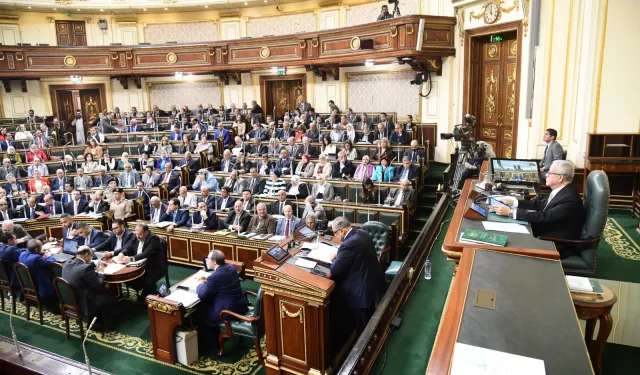Egypt’s Parliament has been reduced to little more than a rubber stamp, a watchdog group has warned, with the executive branch exercising “near-total dominance” over the legislature during its current five-year term.
In a damning report released on Wednesday, the Egyptian Front for Human Rights accused MPs of waving through “authoritarian-leaning laws that curtailed rights and freedoms,” while their basic duty of holding government to account remained “absent and ineffective.”
The report blamed the increasingly authoritarian tilt of recent laws on the iron grip of the pro-government Nation’s Future Party, which holds a commanding majority in the chamber and, it said, “is backed by government and security apparatus supplying it with draft laws favored by the executive authorities.”
The report aims “to highlight Egypt’s urgent need for a genuine, serious parliament and an active parliamentary human rights committee that fulfills its core duty of protecting rights and ensuring Egypt’s compliance with its international obligations, rather than simply glossing over the reality of daily human rights violations,” Ahmed Attallah, executive director of the Egyptian Front for Human Rights told Al Manassa.
Government hegemony over legislation
The report, entitled “Authoritarian Legislation and Lack of Oversight,” revealed that the vast majority of the 879 laws passed by the House of Representatives were proposed by the government, while MPs independently proposed just 16. It cited this disparity as evidence of “a power imbalance in lawmaking, favoring the interests of the executive over the legislative authority.”
Based on research and parliamentary monitoring, the report also concluded that measures such as the Criminal Procedures Law and amendments to the counterterrorism law represented “a reversal of modern legal progress,” and act to “restrict rights and enable violations of human rights and the justice system.”
The draft Criminal Procedures Code came under heavy criticism during parliamentary debate, with rights groups arguing that it would set Egypt’s justice system back by decades by expanding prosecutors’ and police powers to intercept communications, freeze assets, restrict defense rights and allow remote court proceedings without sufficient safeguards, amid the ongoing crisis of ‘case recycling’, which has been used as a way to bypass pretrial detention periods.
The report comes as President Abdel Fattah El-Sisi has referred the Criminal Procedures Law back to parliament for further scrutiny, citing governance, clarity and practicality concerns. According to a statement released by the presidency, “the law requires amends in order to reinforce guarantees for the sanctity of a person’s home, the rights of the accused before investigative and judicial bodies, and increase alternatives to pretrial detention to limit its use.”
Nominal oversight and lack of accountability
With regard to accountability and oversight, the report found that genuine accountability measures such as interpellations and investigative committees were never properly activated in high-profile cases that captured public attention. The most prominent of these cases was the death of 18 girls in a car crash in Menoufiya governorate, along the regional highway.
Another high-profile case the report cites as an example is the case of economic researcher Ayman Hadhoud, who was forcibly disappeared by the security services on March 5, 2022, and later declared dead in Abbasiya Psychiatric Hospital on April 9 the same year. Authorities asserted he was detained due to mental instability, a claim widely disputed.
When MP Rawya Mokhtar called for the urgent formation of a committee to investigate Hadhoud’s case, her demand was blocked and countered by parliamentary deputy, Mostafa Bakry, who, in another urgent statement, framed the case as purely medical, and denied its political or rights-related dimensions. He insisted that “there are no practices of torture or enforced disappearance in Egypt.”
Parliamentary oversight, according to the report, was largely confined to weak measures such as briefing requests and motions by request, and focused almost exclusively on local services in constituencies without addressing key human rights or political issues.
Poor performance
The report devoted a large section to analyzing the performance of the parliamentary Human Rights Committee, ultimately describing it as “limited and weak.”
The report’s researchers found the committee only intervened in five of the 15 laws directly affecting rights and freedoms: the Medical Liability and Patient Protection Law, the asylum law, the new Criminal Procedure Code, the law establishing the National Alliance for Civil Development Work, and amendments to the criminal code.
The report noted that the committee’s intervention in these laws led to no meaningful improvements or changes to their provisions. It found that “except for their amendment to the criminal code, which toughened penalties for harassment and bullying, the other four laws did not comply with Egypt’s international human rights obligations”.
Regarding the government’s proposed asylum law, the Human Rights Committee approved it for discussion, even though it included infringements and non-compliance with international obligations, particularly “its use of criminalizing language that confusingly distinguishes between lawful and unlawful asylum seekers which increases the burden on refugees to prove their legal status while endowing the national committee overseeing asylum applications with arbitrary powers.”
The committee also supported the Criminal Procedures Code despite its provisions “broadening the powers of law enforcement officers, allowing them to conduct home searches and take precautionary measures at their discretion, without a prior judicial warrant or a precise definition of the evidence needed. Furthermore, it contains provisions that directly violate the right to privacy.”
These provisions were among the concerns raised by President Sisi in his objections to the draft law and refusal to give his approval.
The report also criticized the committee’s emphasis on public awareness and media campaigns in response to international criticism instead of fulfilling its real oversight role. It noted that the Human Rights Committee’s visits to detention facilities were “planned and largely publicity-focused,” rather than genuine spontaneous oversight checks.
The report put forward a set of recommendations for the next parliament, most notably “reviewing laws that restrict rights and freedoms,” implementing further measures for scrutiny and investigation, and strengthening the role of the Human Rights Committee in the legislative and oversight process.
